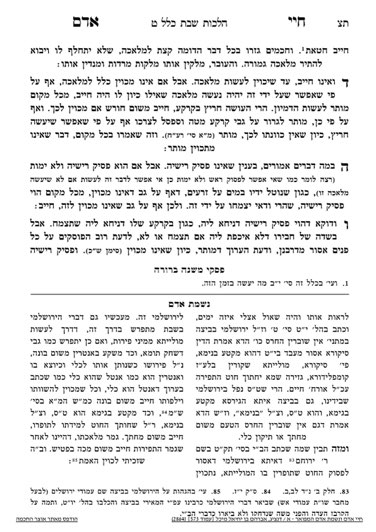We are beginning siman 4, which we will learn together with siman 5 and 6. We have a concept in halacha called davar she’eino miskavein. This machlokes is not limited to Shabbos, and applies throughout the Torah. When a person performs an action and it can result in an unintended aveirah albeit that there was no intent for the aveirah, there is a machlokes between Rav Yehuda and Rav Shimon whether it is muttar to perform the action or not. For example, if a nazir wishes to shampoo his hair, he may pull out some hairs. Although it is not his intent, he may nevertheless transgress one of the issurim of his nezirus. Rav Yehuda holds that davar she’eino miskavein is assur, because the issur in question is an issur deoraysa, so the possibility of pulling out hair becomes a safeik issur deoraysa. We have a rule that safeik deoraysa lechumra, that one must be machmir on a safeik deoraysa, so davar she’eino mishkavein is assur.
Rav Shimon is mechadeish the idea that if a person does not have the kavanah to perform the issur, not only are they patur on the issur, it is muttar to perform the original action, even though this issur may unintentionally occur.
When it comes to Shabbos, it is easier to understand Rav Shimon’s chiddush. We have learned that the issurei Shabbos require meleches machsheves, one of the definitions having been to perform the action with kavanah. If so, if the person does not have kavanah for the action which is assur on Shabbos, we can understand why they would be patur. The chiddush is that Rav Shimon applies his idea beyond hilchos Shabbos.
It seems to be that Rav Shimon is introducing the concept that the Torah does not wish to prohibit animal actions but only human actions. I, as a human being, cannot go against Hashem’s word. Something done with intent is a “human” action, and is the type of action which is prohibited by the Torah. An action which just “happens to occur” is not prohibited by the Torah, because it is akin to not being performed by a person, and therefore Rav Shimon understands that it is not assur. Although the Gemara never explains the source for Rav Shimon, we pasken like him.
Davar She’eino mishkavein gives us a window into understanding how we must perform our actions with intent. Similar to aveiros, we have a concept that mitzvos tzrichos kavanah, mitzvos require intent. If a person takes a shofar purely to hear its notes, they are not yotzei. A mitzvah is using one’s mind to mold something into an action of service to Hashem. Hashem does not need our results, but to perform these actions as human beings.
Summary
- Davar she’eino miskavein is the general Torah concept of performing one action with an unintended aveirah which may occur in addition. We pasken in accordance with Rav Shimon, that it is muttar
- The halacha of mitzvos tzrichos kavanah parallels davar she’eino miskavein.



